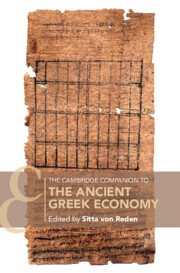Book contents
- The Cambridge Companion to the Ancient Greek Economy
- The Cambridge Companion to the Ancient Greek Economy
- Copyright page
- Contents
- Maps
- Notes on the Contributors
- Abbreviations
- Maps
- 1 Introduction
- Part I Diachronic Perspectives
- Part II Regional Perspectives
- 6 Asia Minor
- 7 Northern Greece and the Black Sea
- 8 Athens and the Aegean
- 9 Egypt and the Ptolemaic Empire
- 10 Hellenistic Babylonia
- Part III Structures and Processes
- Part IV Networks
- Part V Performance
- References
- Index
- Cambridge Companions to the Ancient World
6 - Asia Minor
from Part II - Regional Perspectives
Published online by Cambridge University Press: 21 July 2022
- The Cambridge Companion to the Ancient Greek Economy
- The Cambridge Companion to the Ancient Greek Economy
- Copyright page
- Contents
- Maps
- Notes on the Contributors
- Abbreviations
- Maps
- 1 Introduction
- Part I Diachronic Perspectives
- Part II Regional Perspectives
- 6 Asia Minor
- 7 Northern Greece and the Black Sea
- 8 Athens and the Aegean
- 9 Egypt and the Ptolemaic Empire
- 10 Hellenistic Babylonia
- Part III Structures and Processes
- Part IV Networks
- Part V Performance
- References
- Index
- Cambridge Companions to the Ancient World
Summary
The chapter surveys the economy of Asia Minor from the late archaic period to the end of the Hellenistic era. Asia Minor forms the largest land mass in the northern Mediterranean and is characterized by a diverse geography with different levels of integration into the Greek world and its economy. Throughout time, urbanization significantly intensified; nevertheless, many regions preserved a rural character. Agriculture was most important, in both the land of the poleis and land controlled by the Achaemenid and Hellenistic kings. Production was directed to local needs, but some agrarian products also served as exports; non-agrarian production was less significant. Asia Minor was rich in natural resources, and fishing was important in a few coastal cities. The birthplace of coinage in the late seventh century, Asia Minor saw the circulation of many coinages over time and was highly monetarized at least by the end of the Hellenistic period. These coinages mirror the frequent changes in a political landscape that was characterized by different strata of authority, from the royal administration down to the city-states and villages. Through taxation, public expenditures, and by securing an institutional framework, these authorities shaped the complex conglomerate of Asia Minor’s economy.
Keywords
- Type
- Chapter
- Information
- The Cambridge Companion to the Ancient Greek Economy , pp. 77 - 93Publisher: Cambridge University PressPrint publication year: 2022



